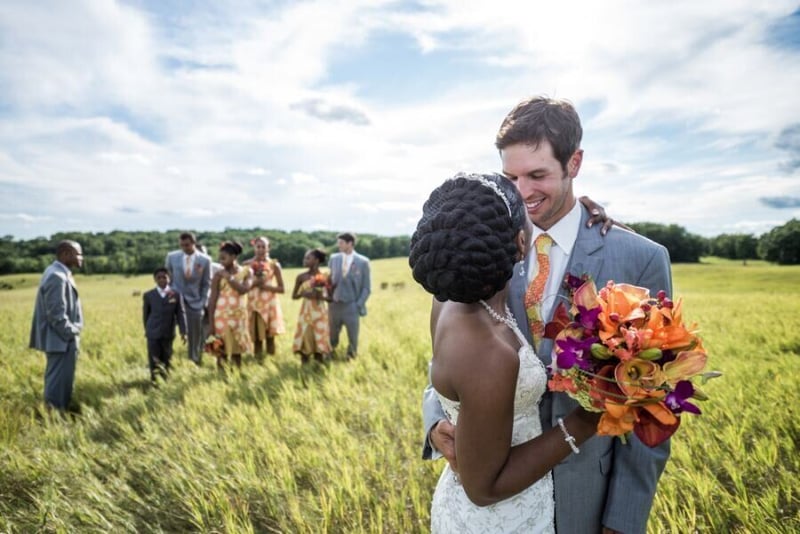
So many ways to say ‘I do”
Weddings are one of the most universal traditions on the planet yet they are celebrated differently by everyone. Tying the knot in any culture comes with a list of different rituals and traditions and, family dynamics aside, there are many more things to consider and prepare for, especially here in South Africa - with our eleven official languages, chiefs, dominees and gogos to consider, it can be tough task marrying two cultures without offending Aunty Mabel.
Despite the umpteen different cultures or religions you may have to incorporate into your ceremony, it is important not to forget to showcase your own personalities - after all, it is ‘your’ day and it is exactly your differences, and similarities, that brought you together that should now be celebrated - for instance, playing your favourite song and teaching Chief Nkomu how to do the shuffle, or giving personalized chocolates as wedding favours instead of the traditional bag of sugar-coated almonds.
And you don’t have to do it all at the ceremony and reception – after an open, honest chat with the family, consider spreading the different traditions. You could plan the ceremony around the bride's heritage and turn the reception into a celebration of the groom's. Or, host the bachelor or bachelorette party incorporating an element from each other’s customs. It’s the perfect occasion to try umqombothi (beer), used to celebrate the home-coming of young men in Xhosa culture, or the Lebanese tradition of zaffe, a rowdy escort of music, dancing and shouting by the groom’s friends and family. For the bride there is the Japanese ritual of pouring saki to reaffirm friendships or the time-honoured tradition of giving “something borrowed, something blue”.
Catering: A little more challenging is serving a traditional meal, because in many cases the menu is limited by the venue, so if a customized menu is not possible try incorporating signature drinks like saki for a Japanese reception or chai instead of coffee for an Indian wedding.
The cake: Traditional Norwegian wedding cakes are made with bread and cheese, and Russian couples share a wedding sweetbread called karavaya which is decorated with wheat for prosperity and interlocking rings for faithfulness, or you could just go with what’s currently on trend.
Wedding invitations: Another way to respect a different culture - for example, the Jewish tradition - is to send a two-sided invitation, with one side written in Hebrew and the other in English. Couples are favoring digital invites these days where guests can rsvp on line.
Banqueting manager at BON Hotel Riviera on Vaal, Dumisane Zondo, says they have hosted several multi-cultural weddings specifically between Christian and Zulu faiths and culture, and the dynamic has resulted in some of the most creative and special occasions. A lovely add-on in the Zulu tradition is when the bride gives out blankets to her new family after the wedding, in a ceremony that is known as ukwaba. Zondo adds, “My favourite part is the dance-off between the families of the bride and groom.”
Some interesting wedding traditions -
As well as exchanging rings, African tradition sees the couple have their wrists tied together by grass or material.
In China, brides pick not one wedding dress, but three!
Before an Indian bride gets married, her family and friends decorate her hands with elaborate designs called menhdi.
Bridesmaids were originally used as decoy brides – through having their dresses similar and standing next to the bride, the spirits who they believed would sabotage the newly-weds’ happiness would be confused.
During the entire wedding day, Congolese brides and grooms are not allowed to smile.
In the Phillipines, the bride and groom release a pair of white doves.
Some sort of leap over a broom is also popular in a number of cultures.
But, when it comes to love and weddings, there are no borders, so enjoy the preparation leading up to your ‘I do’, ‘Ngiyavuma’, ‘Je fais’ or ‘Main karata hoon’ and remember to have fun!
Mazel tov!
Get new press articles by email
Latest from
- CallApp; South Africa's Number 1 App to filter spam
- Looking good!
- Get out of town!
- Get out of town!
- BON Hotels takes on two new hotels in Kwazulu Natal
- Woman2Woman
- Corporates dust off their soccer boots to Have a Ball this Mandela Day
- As a business, what should you do to deal with public liability claims?
- New Appointments
- The importance of independent trustees in a family business trust
- Hospitality Technology Next Generation
- Retirement - spend your time doing the things you love but have never had the time to do before
- BON Hotel Sunshine Enugu opens its doors
- Langebaan Country Estate Weskus Marathon
- BLOG – Travel is not for sissies
The Pulse Latest Articles
- Education Is The Frontline Of Inequality, Business Must Show Up (December 11, 2025)
- When The Purple Profile Pictures Fade, The Real Work Begins (December 11, 2025)
- Dear Santa, Please Skip The Socks This Year (December 10, 2025)
- Brandtech+ Has 100 Global Creative Roles For South African Talent (December 9, 2025)
- The Woman Behind Bertie: Michelle’s Journey To Cape Town’s Beloved Mobile Café (December 9, 2025)
